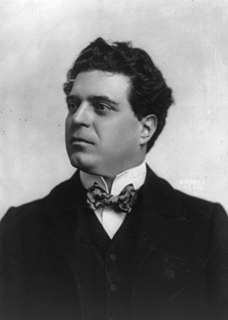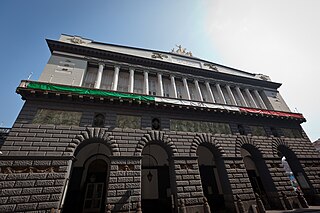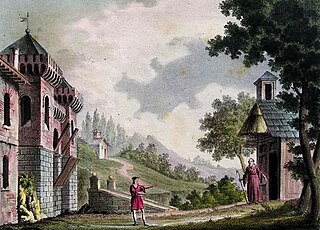
Aida is an opera in four acts by Giuseppe Verdi to an Italian libretto by Antonio Ghislanzoni. Set in the Old Kingdom of Egypt, it was commissioned by Cairo's Khedivial Opera House and had its première there on 24 December 1871, in a performance conducted by Giovanni Bottesini. Today the work holds a central place in the operatic canon, receiving performances every year around the world; at New York's Metropolitan Opera alone, Aida has been sung more than 1,100 times since 1886. Ghislanzoni's scheme follows a scenario often attributed to the French Egyptologist Auguste Mariette, but Verdi biographer Mary Jane Phillips-Matz argues that the source is actually Temistocle Solera.

Pietro Mascagni was an Italian composer primarily known for his operas. His 1890 masterpiece Cavalleria rusticana caused one of the greatest sensations in opera history and single-handedly ushered in the Verismo movement in Italian dramatic music. While it was often held that Mascagni, like Ruggero Leoncavallo, was a "one-opera man" who could never repeat his first success, L'amico Fritz and Iris have remained in the repertoire in Europe since their premieres.

La Scala is a famous opera house in Milan, Italy. The theatre was inaugurated on 3 August 1778 and was originally known as the Nuovo Regio Ducale Teatro alla Scala. The premiere performance was Antonio Salieri's Europa riconosciuta.

An opera house is a theatre building used for performances of opera. It usually includes a stage, an orchestra pit, audience seating, and backstage facilities for costumes and building sets.

The Real Teatro di San Carlo, as originally named by the Bourbon monarchy but today known simply as the Teatro (di) San Carlo, is an opera house in Naples, Italy, connected to the Royal Palace and adjacent to the Piazza del Plebiscito. It is the oldest continuously active venue for opera in the world, having opened in 1737, decades before either Milan's La Scala or Venice's La Fenice.

Teatro Regio di Parma, originally constructed as the Nuovo Teatro Ducale, is an opera house and opera company in Parma, Italy.

The Teatro Lirico Giuseppe Verdi is an opera house located in Trieste, Italy and named after the composer Giuseppe Verdi. Privately constructed, it was inaugurated as the Teatro Nuovo to replace the smaller 800-seat "Cesareo Regio Teatro di San Pietro" on 21 April 1801 with a performance of Johann Simon Mayr's Ginevra di Scozia. Initially, the Nuovo had 1,400 seats. In 1821, it became known as the Teatro Grande.
The music of Milan has ancient roots. The Ambrosian chants are among the first codified music in Western culture, which fact led to the later development of its concept of scales, for example. In more recent history, the city of Milan has been an important social, cultural, political and commercial center not just in Italy, but in all of Europe.

Marcelo Raúl Álvarez is an Argentine lyric tenor who achieved international success starting in the mid-1990s.
An electronic libretto system is used primarily in opera houses and is a device which presents translations of lyrics into an audience's language or transcribes lyrics that may be difficult to understand when sung.

The Teatro Lirico is a theatre in Milan, Italy. In the 19th and early 20th centuries it hosted numerous opera performances, including the world premieres of Donizetti's L'elisir d'amore and Giordano's Fedora. The theatre, located on Via Rastrelli, closed in 1998. However, a restoration project was begun in April 2007, and it has finally re-opened in December 2021 as the Teatro Lirico Giorgio Gaber. Stage Entertainment carried on the renovation of the Theatre, completing all finishes and all workings started by the administration "Comune di Milano".

The Teatro Malibran, known over its lifetime by a variety of names, beginning with the Teatro San Giovanni Grisostomo after the nearby church, is an opera house in Venice which was inaugurated in 1678 with a production of the premiere of Carlo Pallavicino's opera Vespasiano. By 1683, it had quickly become known as "the biggest, most beautiful and richest theatre in the city" and its operatic importance throughout the 17th and 18th centuries led to an even grander description by 1730:
Figaro Systems, Inc. is an American company that provides seatback and wireless titling software and system installations to opera houses and other music performance venues worldwide. The company is based in Santa Fe, New Mexico. It was established in 1993 by Patrick Markle, Geoff Webb, and Ron Erkman and was the first company to provide assistive technology that enables individualized, simultaneous, multi-lingual dialogue and libretto-reading for audiences.

The Teatro Regio Ducale was the opera house in Milan from 26 December 1717 until 25 February 1776, when it was burned down following a carnival gala. Many famous composers and their operas are associated with it, including the premieres of Mozart's Mitridate, re di Ponto, Ascanio in Alba, and Lucio Silla. The opera house also saw the premiere of Maria Teresa Agnesi Pinottini's Ciro in Armenia in 1753; one of the earliest successfully received operas by a female composer. The variant form Regio Ducal Teatro is also seen.
Bicocca is a district ("quartiere") of Milan, Italy, part of the Zone 9 administrative division. It was incorporated in the city in 1841. The main historic landmark of the district is the 15th century Villa Arcimboldi. In the last decades of the 20th century, the district has been subject to a major requalification project that led to the construction of important facilities such as the University of Milan Bicocca seats and the Teatro degli Arcimboldi theatre.

Milijana Nikolic is an operatic mezzo-soprano.
Vincenzo Galli was an Italian opera singer and impresario. Considered an outstanding basso buffo singer, he created many roles on Italian stages, including in two of Donizetti's operas: Ivano in Otto mesi in due ore and Cesare Salzapariglia in Le convenienze ed inconvenienze teatrali. Luigi Ricci composed the role of Michelotto in his opera Chiara di Rosembergh specifically for Galli's voice.

The Teatro Carcano is a theatre in Milan, Italy, located at 63 Corso di Porta Romana. Although now exclusively devoted to plays and dance, it served as an opera house for much of the 19th century and saw the premieres of several important operas. Completed in 1803, the theatre was commissioned by the Milanese aristocrat and theatre-lover Giuseppe Carcano and originally designed by Luigi Canonica. Over the succeeding two centuries it has undergone several restructurings and renovations and for a time in the mid-20th century functioned as a cinema.

Eliodoro Bianchi was an Italian operatic tenor and later a prominent singing teacher. Born in Cividate al Piano and trained in Naples under Giacomo Tritto, he made his stage debut in 1793. Amongst the many roles he created during the course of his 40-year career were Baldassare in Ciro in Babilonia and the King of Sweden in Eduardo e Cristina, both of which were composed by Rossini expressly for Bianchi's voice. He retired from the stage in 1835 and spent his later years in Palazzolo sull'Oglio, where he died at the age of 75.

Marco Filibeck is an Italian lighting designer.















